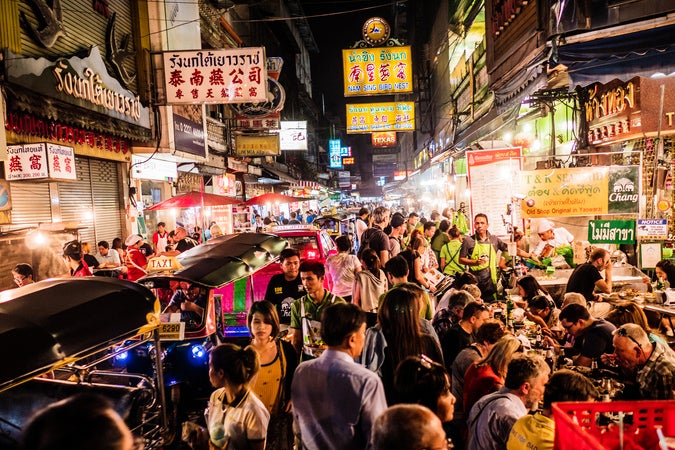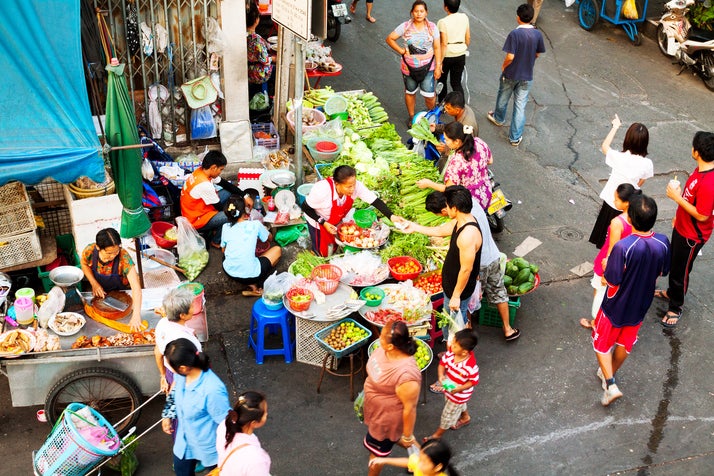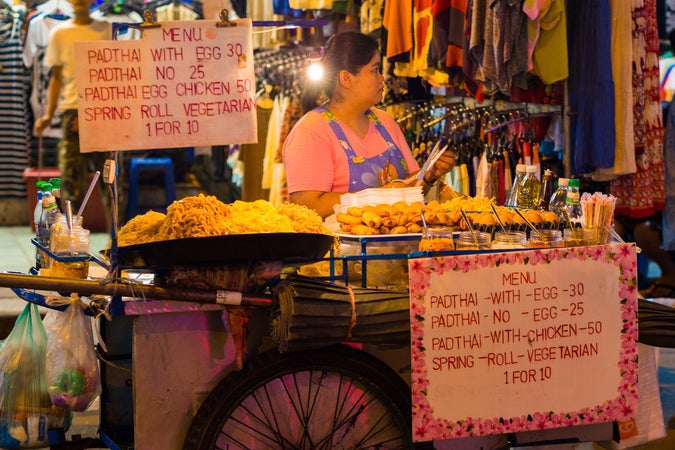Bangkok street food ban: Is the Thai capital really getting rid of vendors?
News that Bangkok’s thriving street food scene is under threat has spread far and wide – but there are some doubts about whether it’s actually happening

Your support helps us to tell the story
From reproductive rights to climate change to Big Tech, The Independent is on the ground when the story is developing. Whether it's investigating the financials of Elon Musk's pro-Trump PAC or producing our latest documentary, 'The A Word', which shines a light on the American women fighting for reproductive rights, we know how important it is to parse out the facts from the messaging.
At such a critical moment in US history, we need reporters on the ground. Your donation allows us to keep sending journalists to speak to both sides of the story.
The Independent is trusted by Americans across the entire political spectrum. And unlike many other quality news outlets, we choose not to lock Americans out of our reporting and analysis with paywalls. We believe quality journalism should be available to everyone, paid for by those who can afford it.
Your support makes all the difference.By the end of 2017, all Bangkok’s street food vendors will be gone, reported The Nation on April 18. The story captured the imagination of many news outlets and has now been covered by the international press to much wailing and gnashing of teeth. However, it is still unclear whether the controversial move is really happening.
According to the story by The Nation, the Bangkok Metropolitan Administration (BMA) has declared it will purge backpacker favourite Khao San Road and Yaowarat of the popular food stalls that line the streets. It reported the chief adviser to Bangkok’s governor, Wanlop Suwandee, as saying: “The BMA is now working to get rid of the street vendors from all 50 districts of Bangkok and return the pavements to the pedestrians. Yaowarat and Khao San Road will be our next goal in clearing out illegal vendors.”
But locals on the ground are suggesting Suwandee was misquoted, and that there is no proposed blanket ban for street food vendors – rather, there will be more regulation around when and where vendors can set up and sell their wares.
Richard Barrow, one of the longest running travel bloggers in Thailand, has claimed the report is “fake news”. He said on Twitter: “Wanlop Suwandee, chief adviser to Bangkok’s governor denied that he said Yaowarat and Khao San would be the next target.” He added: “As expected, the man The Nation interviewed denied he said there'll be a blanket ban on street food. Chinatown and Khao San will stay the same.”

Sally Mairs, Thailand correspondent for news agency AFP, said Suwandee had told her that vendors would not be barred from these areas but “regulated” – for example, they would only be allowed to sell during certain hours of the day.
This idea is backed up by The Bangkok Post, which reported there are plans to "improve the pavements and impose zoning and opening hours on street food vendors on Yaowarat and Khao San roads" and that "footpaths would be repaved, cleanliness would be improved, food stalls would show unique designs, and traffic flows would be facilitated to prevent congestion." The Post's article does mention that street vendors have been removed from 431 locations in Bangkok; but this is reported in the context of bigger plans to improve the city. There is no suggestion of there being a ban in the areas mentioned.
Thai natives are similarly sceptical about the alleged ban. Chin Chongtong, founder of Chili Paste Tour, which provides food and culture tours of Bangkok, said the “ban” had been wildly misreported. “I think now is too early to say what is really going on,” she told The Independent. “I’ve seen many articles by the foreign press saying ‘Bangkok bans all street food’ – that is ridiculous and untrue.
“Even if all vendors are cleared from main roads, they can still sell in many markets and small streets. And if they can move around, for instance if they have wheels on their cart, or even if buildings let them sell out front on private land, there’s no problem – that’s how I understand it anyway.”
Chongtong said locals believe it is a matter of regulation rather than prohibition. She added: “I’m hearing people say today that vendors will be allowed to sell on footpaths at Yaowarat and other places after 7pm. A lot of streets in Bangkok have had this rule for over a year. We will soon see what is really going on.”

Chongtong’s foodie tours won’t be much affected by further regulation, as she takes guests to permanent covered markets and shop houses. But she is worried for some of her friends who are vendors should there really be a blanket ban on the practice. “I am worried about the footpath vendors – if they don’t have a place to sell, how will they make money?” she said. “But I think sometimes it’s not safe or clean to have stoves on busy footpaths with lots of pedestrians.”
Holiday companies, meanwhile, are convinced that, ban or no ban, the capital will adapt and flourish. Louise Nathan, product and innovation manager for Thailand specialist Selective Asia, told The Independent: “Everything changes so quickly in Bangkok, it’s constantly evolving. Every time I go back things have moved on. If it’s true that the street food vendors will be banned, it’s a real shame. But equally the Thai people are so entrepreneurial they always find a way to get around the changes that don’t suit. Street food won’t disappear – people will find creative ways around the new rules, as they always have done.
“My feeling is that officials might focus on key areas where vendors will be prohibited, but there will be other areas that they can still do it. And a lot of the same food can be found in covered markets and floating markets around the city.”
Even with a potential regulatory crackdown on the horizon, there seems little danger that Bangkok’s distinctive street food scene will disappear from the city.
Join our commenting forum
Join thought-provoking conversations, follow other Independent readers and see their replies
Comments